
THRESHOLD – The Progressive March
Anthony Morgan
November 2012
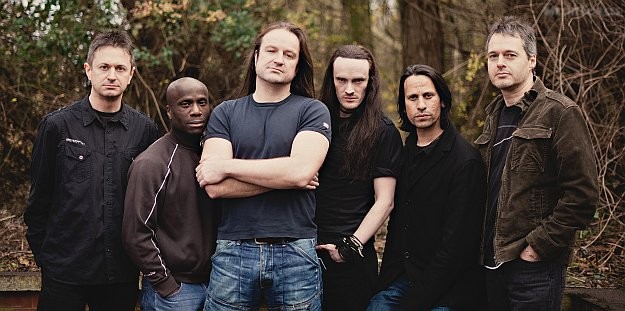 Threshold (l-r): Richard West, Johanne James, Damian Wilson, Pete Morten, Steve Anderson and Karl Groom |
![]()
It was publicly revealed on July 23rd, 2007 that vocalist Andrew ‘Mac’ McDermott had parted ways with British progressive metallers Threshold, his exit taking place several days prior to scheduled appearances at the Metalcamp and Eartshaker festivals in Slovenia and Germany respectively. Andrew lent his vocals to five Threshold studio full-lengths; Clone (November 1998), Hypothetical (March 2001), Critical Mass (September 2002), Subsurface (July 2004), and Dead Reckoning (March 2007).
“He cut off all ties,” recalls Richard West, keyboardist of Threshold. “From the moment he sent the message he switched his phone off, so we couldn’t reply back to him. We couldn’t call him, and he refused to take any calls or have any conversations with us. It was just the weirdest thing. All we could deduce from the fact he wanted to get on with his life is maybe he needed a more reliable income or something. I don’t know. Threshold – like all bands – is fairly sporadic in terms of when you get paid, but it’s weird because we had spent so much time together making the album, talking about our hopes and dreams for it, planning big touring and everything, and then he just disappeared. I can only guess that there were other factors that he didn’t wanna talk about.”
Having occupied behind the microphone stand for debut effort Wounded Land (September 1993) and third outing Extinct Instinct (March 1997), singer Damian Wilson returned to the fold. “We were just about to go on tour to support Dead Reckoning when when our old singer Andrew McDermott sent us a message to say he wasn’t coming,” the pianist recounts. “It was the day before he was supposed to come over and rehearse with us in Germany, and I think we had maybe five to six days until our first show. It was a really big surprise. He didn’t even explain why; he just said in a message that he had to get on with his life, which was weird because we thought Threshold really was a big part of his life. We were quite surprised, because he had made it very clear that he was really excited about the new album and everything we were doing. We were totally surprised, and really shell shocked.
“We didn’t want to cancel shows, because that’s just not a good thing to do. Fans buy tickets, book flights, and book hotels. We did talk very briefly at the time about having vocalist auditions, but we didn’t have very long. Over the years we’ve had three singers, which is ludicrous for any band. Your dream is that you have the same line-up for your whole career, so the fact that we’ve managed to still keep our fanbase is quite fortunate. The thought of having a fourth singer… We thought that would just be a bit of a joke really for a band. We might as well have just called ourselves a project or something, so we really thought that it had to be Damian or Glynn (Morgan, vocalist on November 1994’s Psychedelicatessen). It was so obvious to go back to one of those two.
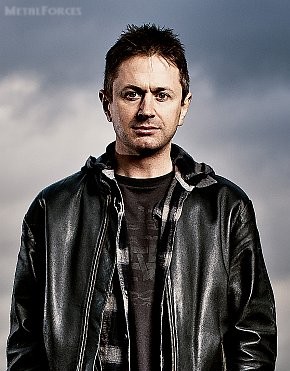
|
“Luckily I had been working with Damian about a week before in the studio on another project, and he had spoken about Threshold. He said to me ‘I really miss the band. If there’s ever an opportunity, I’d love to have another shot.’ A week later he got a phone call (laughs), and he came back in. He was the hero of the hour, and we did the shows. After that he then did a tour, and some more shows. With every show we did, he just became more and more part of the band. There was never a day where we said ‘We don’t have a singer again.’ Slowly he made his way back in I think. To be honest it was down to timing though; Damian was here and he was ready, and he was available. We didn’t actually have a way of getting hold of Glynn at the time, so it was a pretty easy decision. If it was another month it might’ve been Glynn who came back.”
Damian’s late 90s departure was an amicable affair. “I don’t think he ever really wanted to leave, to be honest,” Richard feels. “That must’ve been about 1998. We had done the Extinct Instinct album, and we had written Clone. It was mostly recorded, and we were just ready to do vocals. Damian got offered this other job out of the blue, which was to sing the lead role in the musical Les Misérables. It was a fantastic offer, and Threshold wasn’t really doing much back then. Doing an album and then a two-week tour wasn’t really enough to call it a career. He needed something more, so he took the job. He then said to us ‘I don’t wanna leave Threshold, but at the same time I’ve gotta start rehearsals on this West End musical thing next week. I don’t know when I’ll be able to do the vocals.’
“We had studio time booked and a schedule with the record company, so we made the difficult decision that we needed to finish the record. Damian didn’t know when he would be available though. It sounded like it was gonna be two years, which in fact it was. We would’ve had to have waited two years to do that record (laughs), which would’ve been a bit long. We split on friendly terms, but he never particularly wanted to leave. He just got busy. That’s what Damian does; he’ll find suddenly find himself in five different bands and three different projects, and suddenly he can’t do everything. Let’s hope that doesn’t happen again (laughs).”
Damian’s musical commitment towards Threshold isn’t exclusive. “He’s in four bands,” the pianist chuckles. “He’s a permanent addition to Threshold and also another band he’s in, so hopefully we can keep making it work. Everyone in the different bands are all friendly, and we all understand the situation. Most musicians these days have to be in more than one band and working on more than one project to make it sustainable.”
Threshold had accordingly adapted its songwriting tendencies during Andrew’s tenure. “I guess we just got very familiar with being with Mac,” Richard muses. “We did five albums with Mac in the meantime, and we wrote in a slightly different way. He had a heavier, more growly sort of voice, so it meant that the writing style changed a bit. It was a bit more straight ahead metal in the way we approached things whereas when Damian left we had just done Extinct Instinct, and that was a much more progressive album I think. Yeah, he had to adapt to that side, but the good thing was he came in for the touring phase so he came in to do Mac’s songs. He got very used to having to change while we were touring. We did about 60 shows together, so by the time we went into the studio he knew what we were about and knew what the new Threshold was.”
Writing sessions for August 2012 record March Of Progress – their ninth studio proper overall – didn’t begin until 2009, 2008’s time being consumed by a separate release. “In 2008 we were putting together our singles box set called Paradox, which is eight discs each with three tracks on them,” the ivory-tinkler begins. You got a single and then two B-sides, and the B-sides were all rare songs or unfinished songs or unreleased tracks. We spent a lot of time recording them and putting them together. That took up a lot of time in 2008, and I think we just about started writing in 2009. That was quite a slow process, just working out how Threshold was gonna sound for the new album. We didn’t want to lose everything we had been building towards with Dead Reckoning – the new, modern Threshold sound – and we didn’t wanna go back to just making another Threshold record with Damian sounding like the old ones. It took awhile before we found that sound I think, and worked out what the modern Threshold was gonna sound like. It started slightly in 2009 and 2010, and then we finished everything in 2011.”
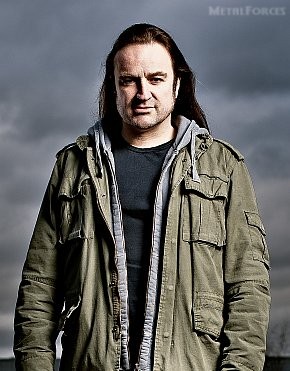
|
The outing marks the first Threshold studio platter to feature guitarist Pete Morten, whose tenure was disclosed on January 17th, 2007. “I think he was recording one of his bands down at Karl’s studio, and they just got on well,” Richard shares. “I think Karl realised he was a nice guy, a good player, and a good writer, and when Nick Midson left I think just before we made Dead Reckoning we needed somebody obviously to tour. We asked ’Can we really do this with one guitarist?’ We did the album Dead Reckoning with just one guitarist. That’s easy isn’t it because you just do overdubs, but onstage we really couldn’t create the Threshold sound with just one guitar. We really need two to make that sound, so Karl instantly thought of Pete I guess. The same way we got Damian back we got Pete because he was just around at the time, and was willing and available. There was no audition process for either of them. We just knew they were there, so we asked them. Pete’s been invaluable.
“He’s been great fun on tour; he’s such a nice guy. On the tour bus he brings a lot of comedy which is great, because we can all be a bunch of serious guys sometimes. It’s really nice. He’s like the little brother that has fun with everybody. He’s good; he’s a good player, a good writer. He plays really well, and does a great job for us. He’s quite a quirky guy, and that comes out in his writing. For him to write a couple of songs for the album, we’re very happy with that. I guess because he’s been out as well doing 60 shows with us, he knew our sound. He didn’t try to write a Pete Morten track, and was able to write a Threshold track.
“With his own band called My Soliloquy you can really hear his personality in it, and it’s quite a quirky album. It’s very good, because you can hear his personality. I think with Threshold he managed to tone that down, so you just get a little bit of his personality which is nice. Obviously I’m no analyst, but I think if you heard his My Soliloquy album (The Interpreter) which’ll be out soon and then listened to the two tracks that he wrote, you just hear that certain flavour. A bit like with Queen where you could tell it was written by Freddie (Mercury, vocals), or Brian (May, guitars), or by John (Deacon, bass), or Roger (Taylor, drums). It just sounds like Queen, but you can hear a certain different vocabulary musically. I think if you hear anything that sounds a little bit off the wall, then you can probably guess that that was Pete’s idea. You can tell that he wrote it, but it still fits on the album. He’s just fitted in really nicely. It’s a pleasure to have him with us.”
As was the case with preceding studio records Obsessive and Dead Reckoning, March Of Progress was mostly penned by Richard and guitarist Karl Groom. “What tends to happen is Karl will write a whole load of instrumentals, and they’re fully formed,” the organist describes. “They’ve got all of the drums, bass, and guitars, even some of the solos. Quite a few of the keyboards are mapped out as well, and then he gives me a complete instrumental because Karl doesn’t write lyrics. I’m sent a pile of instrumentals, and I write all the lyrics and melodies for them. I’ll then record all of the vocal demos here, which I’m not the best singer, so (laughs)… There’s a lot of auto-tuning going on and they’re not for public release, but then all of the vocals and harmonies all get mapped out.
“When we’re finished we’ve got complete demos, so we know exactly how the songs are gonna sound. We then need all of the players to come in and actually play the songs for us. The other half of the songs are just written by me, so I do the whole thing. I do the instrumentals, and then the vocals too. That’s how it’s been the last two albums. We kept that process going for March Of Progress, but then fortunately we also had some of the other band members write. We always try to encourage that, but it doesn’t always happen. This time Damian’s written a song, and Pete Morten our second guitarist has actually written two songs like I said – one is a bonus track. Even Steve (Anderson) our bass player has contributed to one of the songs with a few riffs so it’s a little bit more collaborative than usual, which is nice.”
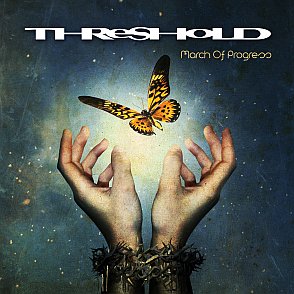
|
Richard contends the fact that several of Threshold’s members contributed tunes causes March Of Progress to be a more varied album. “It goes back a long way back, back to Psychedelicatessen, the second album,” he adds. “With the first album Wounded Land, it was all written by the three founding guys, Karl Groom, Jon Jeary, and Nick Midson. With the second album suddenly I was writing and the new singer Glynn Morgan was writing, and it really changed the flavour. I think that’s why Jon Jeary called it Psychedelicatessen, because it was like a delicatessen. You can go in there and choose all of these different flavours, and it feels a little bit like that with March Of Progress. It just opens up the perspective a bit. There’s a little bit more diversity in there, but that said I think it’s a very coherent record. It doesn’t sound like a compilation; it does sound like one body of work.”
Layered vocals prevalent during the Mac era have been carried over into Threshold’s current chapter. “Certainly with Mac, one of the things we really changed was we brought in more and more layers of vocals,” the keyboardist critiques. “I was writing most of the vocals and melodies by that point, certainly by the last couple of albums with Mac. I was enjoying building up that almost Freddie Mercury style where you have just layers upon layers of vocals, and it worked really well for Mac’s voice and he was quite happy to come in and do that. That’s something we never really tried before with Damian. There were a couple of bits on Extinct Instinct where we layered up the choruses, but really not very much.
“I think when Damian came back into the studio, he suddenly found this was all there to do as well. He finished the leads, and then he had to do 48 layers of backing vocals or something. I think that was probably bit of a shock to him. That’s one of the changes. It doesn’t dominate our sound, but it’s one of those layers that we really find important for the modern Threshold sound. I think everything’s just a bit more technically minded now. Even when there’s a really nice, simple, easy melody, the riffs underneath are generally a lot more technical and complex than they used to be. We’ve already kind of embraced that modern prog metal thing, whereas I think probably when we started Wounded Land it was more classic rock meets prog. We’re certainly a bit more technical these days.”
Richard chalks Threshold’s growing technical sensibilities up to evolution. “As we’ve gone on we’ve become better writers and better players, and that’s just worked its way into the music,” he observes. “It was never a conscious decision. I think we’ve probably always played to our ability, but we’ve become more technically proficient. I think with every album you want to stretch yourself as well. With this sort of music we don’t want to keep making the same records, so we’re always finding ways to stretch – even things like time changes. Some of the songs have so many subtle time changes going on constantly in the background. If you sit there and try to work it out you’d be there with a calculator, whereas in the old days the time signatures were a lot more simple. A lot of things are just in the background. The way things are written has really evolved as we’ve become more confident and competent I guess in what we’re doing. The more you do, the better you get I guess.”
The pianist is constantly attempting to achieve that elusive piano sound he can hear in his mind. “I have a big love of piano in rock just because not many people do it, and when you can do it in a way that works I love it,” he expresses. “Not the old honky tonk kind of piano, but just atmospheric riffs and that kind of thing. I’ve done a bit more of that than usual. Songs like ‘Colophon’ for example have quite a bit of piano, and ‘Staring At The Sun’. I really enjoy getting that to work, and also I’m a big fan of those old, big Gary Numan sounds from the late 70s and early 80s. I’ve never really gone there so much in the past, but I’m going there more now. I think ‘Hang on… That’s the stuff I love, so let’s try it out.’
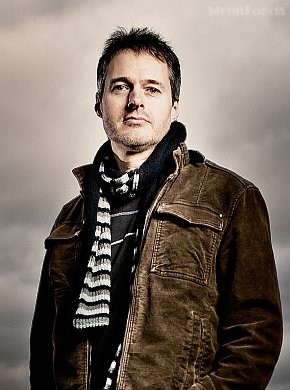
|
“You’ll find a few lead lines with that kind of sound going on this time, and probably even more on the next album. It’s just a lovely sound. Synths used well are just beautiful things, so I’m trying to move a bit more in that direction and a bit less Hammond organ and strings – the stuff that everyone puts on everything. I’m trying to move a little bit away from that, and then plus my leads as well. A big part of Threshold is all of the solos that we all do; we spend a lot of the time trying to get the perfect lead every time, which is always fun – stretching your playing and stretching your fingers as much as possible.”
Late Deep Purple member Jon Lord is an influence on Richard’s playing, Jon having passed away from a pulmonary embolism on July 16th, 2012 at the age of 71. “Subliminally I think, yeah,” Richard acknowledges. “He loved his distorted Hammond sounds, and certainly in the past we’ve done a lot of that. I don’t do so much these days, but yeah, I grew up listening to him. He was one of the guys that made keyboards in rock music work, wasn’t he? Absolutely phenomenal talent and legacy. So yeah, subliminally he’s definitely there.”
Pianists like Yes alumni Rick Wakeman and musicians of that ilk generally influence progressive players. “With no disrespect to Rick at all, I don’t really know much of his stuff,” the ivory-tinkler confesses. “It’s funny, because I know when I joined Threshold there were some guys in the band who were really into Rush and some into Yes, and I was more into Genesis and Queen. I kind of brought in a slightly different flavour, so probably more Genesis would come into it and like I say, people like Gary Numan – people you wouldn’t expect. People who just managed to take the synth somewhere that it hadn’t really gone before.”
That’s something different. “That’s what I hope, yeah,” Richard concurs. “I don’t tend to listen to that much prog metal partly for that reason, that I don’t want to be influenced by my peers. The last thing we want to do is all sound the same. Keyboard wise, my influences come from different places and I listen to a lot of modern music. Modern music and production comes into it a lot.”
Many modern progressive metal groups try to sound like Dream Theater, unfortunately. “I remember in the 90s when Dream Theater first got big,” the organist embellishes. “Loads of bands started and they only had one influence, and you could tell it was Dream Theater. If you’re a musician and you’ve only got one influence, then you’re stuck aren’t you? That’s what you’re gonna sound like. If you’re a musician who has 20-30 influences and you just let them all be a small part of what you do, then you’re gonna create something new. I think that’s what we’ve always tried to do with Threshold. I think that’s one of the reasons we sound a bit different than other prog metal too, because we’re British. Pretty much all of our influences are British. I know prog metal isn’t specifically a British thing, but I think what we do is though because that’s where we come from.”
British groups are audibly different to American groups, but it’s difficult to pinpoint that sonic contrast. “I agree, but I can’t quite work it out either,” Richard admits. “I love the fact that it is though. I also love the fact that we can then just be a British band sounding British, but I don’t know why that is either. It’s just about what subliminally goes into you while you’re growing up, just to find your musical character I think. That’s what comes out when you write.”
Opening composition ‘Ashes’ was originally titled ‘March Of Progress’, the erstwhile track title eventually lending its name to the album itself. “We liked it so much we made it the album title,” the keyboardist enthuses. “Really, most of the lyrics on the album are looking at the life cycle of things. They’re looking at how you can start up a business or a relationship, or an empire – anything really. You fight for it, you really work hard, and you get to a point where it’s doing really well. You then take your foot off of the gas and you start cruising, thinking ‘Yeah, this is going really well.’ Before you know it you’ve become complacent, and you’ve become apathetic. Before you know it the whole thing falls apart, because you stop fighting for it. I think that theme comes into the lyrics in at least half of the songs, looking at it from different perspectives and from different parts of that life cycle.”
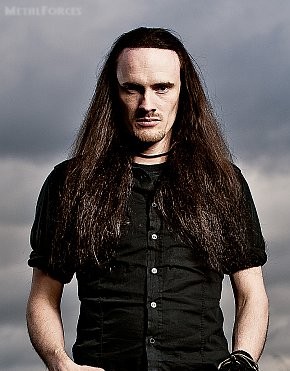
|
The above could perhaps be interpreted as a veiled reference to Threshold, but Richard insists this isn’t the case. “I hope not,” he laughs. “I hope not. That certainly wasn’t the intention. I had heard about this thing called the ‘Fatal Sequence’. Somebody studied I think the Athenian empire from about 2-3,000 years ago… I was gonna say ‘Don’t quote me on that,’ but of course that’s exactly what you’re doing isn’t it (laughs)… It was sometime around there, and they discovered this life cycle of an empire that rises up from bondage and slavery up into freedom. Then it goes through these nine phases of prosperity and liberty, and then complacency, dependency, apathy and back down into bondage again.
“They said that this generally took about 250 years, and then they tried to apply it to other empires and saw a similar model. I was quite fascinated by this because like I said, you can apply that to anything really – relationships, companies, any idea that you have. I did most of the album looking at different subjects from different points of view of different parts of the ‘Fatal Sequence’, and inevitably it’s getting applied to Western civilisation where they think we’re reaching the apathetic dependency stage. That creeps in a little bit, not that we want to be political. It’s just one of those subjects that comes in there. But no, I wasn’t really thinking about the band. I hope we’ll never reach that stage. We want to be one of those bands that stays at the successful stage for the rest of their lives.”
Occupying seventh position upon March Of Progress’ track listing, ‘That’s Why We Came’ was authored by Damian. “He had written it, and it was just a little acoustic song,” the pianist judges. “It was just him on acoustic guitar, but he had bigger dreams for it in his head. He could hear it as a big song, but he’s not a producer. He’s not one to put onto tape or computer a whole arrangement. It’s not his thing, because he’s a writer and a singer. I went down to the boat that he was living on – he was living on a houseboat – and recorded him singing this song on my phone. I then took that away and tried to build up the arrangement for him the kind of way he described it to me, so I hope I’ve done him justice. It’s quite difficult trying to realise someone else’s vision, but he seems happy with it, so… (laughs). I hope I’ve done a proper job. It’s always a dangerous thing to do.”
Penned by Pete Morten, part of ‘Coda’ pays tribute to former vocalist Andrew ‘Mac’ McDermott, who sadly passed away from kidney failure at the age of 45. “I think not the whole song, but I think he said the second verse is his tribute to Mac which was a nice thing to do,” Richard praises. “It’s funny… It’s not something I really thought to do lyrically, because we don’t really write songs about ourselves or each other. It didn’t really occur to me to do that. We’ve done tributes to him on the web, and that kind of thing. It didn’t really occur to me, which I hope isn’t my own stupidity. It was really nice that Pete thought to do that though, and I think he’s done it very nicely.”
The ivory-tinkler’s memories of Mac paint a troubled individual. “He was a phenomenal singer, and in equal parts phenomenal and infuriating I would say,” he reminisces. “I think it’s pretty well documented he had a pretty serious drinking habit, and you can imagine that that causes all sorts of difficulties and problems. Whether it was in the studio or onstage, you just never quite knew what you were gonna get. Some days he’d be quite brilliant, and then the next day he couldn’t remember anything. Alcoholism is a terrible thing, and as far as I’m aware that’s eventually what killed him.”
Generally speaking, Threshold doesn’t consume much alcohol nowadays. “It’s funny,” Richard remembers. “Back in the 90s you go out on tour as a young band, and you get backstage. There’s a fridge full of a 100 beers and you just feel like the world’s coming away, so you have a few before the show. You get onstage, and you’ve got a couple more down by your feet. You play a pretty shockingly bad show, because you’re quite hammered. You can’t get all of the solos out quite the same. You’re so drunk… well, not drunk, but you’re a little bit tipsy so you don’t really notice how badly you did. You then get offstage, and have a few more. I think after a couple of tours we realised it was just so stupid.
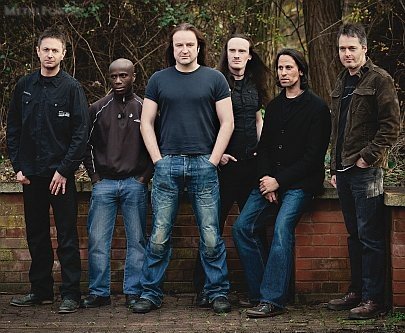
|
“You can do that in some kind of rock ’n’ roll band maybe, but when you’re trying to play technical progressive metal you’ve gotta be on top of your game. We managed to get that out of the equation, so now if you come to a Threshold tour you’ll see how no-one drinks before the show. No-one’s really drinking during the show either; we might just have one bottle onstage just to kind of relax ourselves a bit, and then it’s just a nice, sophisticated bottle of red wine on the tour bus on the way to the next show and that’s it. We feel a bit older than we used to (laughs).”
Swansong cut ‘Rubicon’ reflects over the career of Threshold. “‘Rubicon’ just takes a fond look back at what we’ve done, and the fact that we’ve managed to continue and maybe extend our seasons a little bit longer than we thought,” the organist explains. “Certainly when Mac left the band, I know he thought we’d stop. I’m sure a lot of our fans thought we would as well, so even by making March Of Progress it does feel like we’ve managed to extend our life cycle a little bit for which we’re very grateful. That song really addresses the subject I guess, but no, I don’t think we’ve reached the complacent stage. We still work really hard, and we just wanna keep on making things better and better. In some ways we’re still trying to rise up to that peak. We haven’t peaked and fallen.”
Five years separate the issues of both Dead Reckoning and March Of Progress, which is a great length of time. Threshold is arguably attempting to rebuild its profile. “We never really stopped,” Richard stresses. “When Damian joined, we made a conscious decision just to do a bit more touring and keep on touring. As a band we were really enjoying it we found more than ever. It was a great unit. With Damian coming back having gained so much experience from other things like Les Misérables and also touring with the Rick Wakeman band for awhile, he came back quite a different guy to the one who left back in 1998. He was a good frontman then but he came back as a great showman, and so we were really enjoying the shows.
“We just kept on doing them, and so we kept putting off the idea of going back to the studio. Like I said, the box set slowed things down too because it meant we were focusing on that. For some reason it then just took awhile to find that sound again, maybe because we’d spent a few years not writing. There was never an intention to slow down full-stop. It’s just sometimes things take a bit longer I guess, but this time we’re planning it slightly different. We’re hoping to bring out another album at the end of 2013 – that’s the plan. We’re about to start writing the new one, because we don’t want to wait another five years.”
The recording process for March Of Progress “was very long, very slow. Like I said, we had all of the demos so we knew what was going on. We then sent out the demos to all of the musicians, and then they each come in one at a time and record. Obviously drums are first, so Johanne comes in and puts his personality on what was played on the demo. Steve then comes in and does the bass, Karl and Peter do the guitars, and near the end of the process I do the keyboards. We then get all of the vocals done, so it’s quite a linear process and is done one chapter at a time. We don’t all get in a room and jam; I don’t think that really works for prog.”
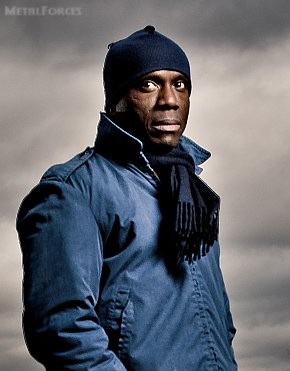
|
Once again, the keyboardist and Threshold bandmate Karl Groom handled production duties. “I think it helps that we’ve written most of the songs, so we’ve already got a very strong vision of what we’re trying to make,” Richard gauges. “We also technically know what we’re doing in the studio which is obviously quite important, but we tend to oversee different parts each. While Karl’s looking after drums and guitars over at his studio, I’m normally looking after bass, vocals, and keyboards at my studio. We then go back to his studio to mix. In this case Karl did the whole of the mix on his own, and then he was just sending me rough mixes by email and I’d comment.
“It’s funny. Ten years ago we’d both be in the same studio all of the time, because it was the only one we had. Everything was going onto tape and we had one mixing desk in front of us, so we needed as many hands as we could. We both had to be there all of the time, but nowadays it’s a bit more disconnected because you can do things over the internet and I’ve got my own studio now. Quite often we find that there’s two men sitting in their own studios alone collaborating at a distance, so it’s quite a weird process. I have to say I think I prefer the old days, because quite often you’re trying to suggest changes or make little adjustments and by email it’s quite hard. It’s quite a long time before you get the conversation resolved, whereas if you’re in a room together it’s instant. We’ve got a process that works, but I kind of miss the old days.”
Italian artist Davide Nadalin additionally returned to design the outing’s cover artwork. “I couldn’t tell you the other bands he has designed for, because they’re not bands that are in my CD collection,” the pianist concedes. “He did the last Threshold one though – Dead Reckoning – the one with the zeppelins on the front, which we loved as a piece of work. We went back to him again, and he did the new one.
“Both times we just told him what the album was about, because both albums have a vague storyline – there’s a certain theme. We explain the theme to him in three to four sentences, and ask him to interpret that in his own way. We found that that is the best way for artists to work. If you tell them what you want as a picture, then they really struggle to try to recreate what they think’s in your head. It’s like they’re shackled, so the last thing we want for Davide is to be shackled like the man on the cover (laughs). We want him to be that free butterfly. It’s his interpretation of the lyrics, which is nice. It’s very interesting to see, and actually with that one, that was one of two ideas he came up with. The other was based on the second song which didn’t look quite right for us, so we chose the butterfly. It’s really a bit different for Threshold – we tend to have slightly harder images than that. A butterfly is quite soft for us, but we love the picture. I think it works really nicely.”
November 16th, 2012 saw the reissue of Threshold’s back catalogue (sans Dead Reckoning) through Nuclear Blast Records. Dubbed ‘Definitive Editions’, each include bonus material. “They’re just a practical thing, really,” Richard ponders. “We’ve moved to Nuclear Blast. All those old albums were released through Inside Out Records and those contracts have now expired, so those albums are no longer available. That’s obviously a silly thing to do if you’re a band, so we needed them reissued. Nuclear Blast have taken on the job, and have released the definitive edition series. Obviously from Nuclear Blast’s point of view, they wanted to make them as appealing as possible. We’ve crammed them full with as many bonus tracks as you can fit on a CD, so they really are definitive and good value for money. The mastering’s been tweaked a little bit, so they sound slightly better in some cases and hopefully they really are the definitive editions.
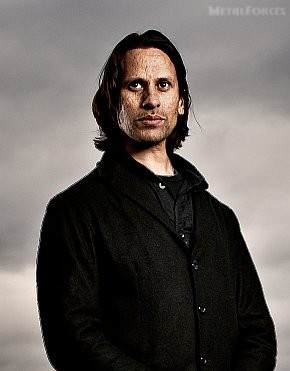
|
“I don’t think we’ll ever need to release them again; unless a brand new format comes along or something, these are the editions that will live on into history I hope. They’ve got some really interesting bonus tracks. Some of the tracks are from the Paradox box set, and some are taken from other fanclub releases over the years. There are some nice rarities on it, and they’re really the ones which make the most sense to come after the album. When I was a kid I used to love how you’d buy an LP, and then the first thing you’d do was put it on tape so you could listen to it in the car or anywhere else. There was always room on the end of the tape to put on a couple of B-sides or an extra track, so it’s the same kind of mentality. What we’ve tried to do here is put on the most relevant tracks to fill out the discs at the end. They’ll certainly get great value for money packages, because they’ll be crammed to the brim. I hope the fans love it. I hope they don’t feel like they’re being ripped off into buying more editions, because that’s certainly the last thing we want to do.”
March Of Progress’ successor will hopefully arrive in a more timely fashion. “We did our fifth and sixth albums in 15 months or something like that, and that was good,” the ivory-tinkler figures. “That worked really well for us, and we should’ve kept that going really. I think Hypothetical, Critical Mass, and Subsurface were three albums in four years, so we know we can do it. I don’t know why things slowed down so much at the end, because I think the time between Subsurface and Dead Reckoning was three years. The time between Dead Reckoning and March Of Progress was five years, so we seem to be getting slower. If we go on that way it’ll be seven years before the next one, and that’d be crazy. The world might not even exist then if you listen to all of the prophets of doom (laughs), so we think we’ll get on with it quickly. By the end of making March Of Progress we were really back in the flow of things. We remembered how to do this, so I think making the next one will just keep on in that flow.”
March Of Progress was released on August 26th, 2012 in Europe (excluding the UK), in the UK on the 27th, and subsequently on September 11th in North America, all through Nuclear Blast Records.
Interview published in November 2012. All promotional photographs by Robert Burress.
Related Posts via Categories
- SCOTTISH SICKNESS – A Report On The Scottish Death Metal Scene, Featuring BRAINBATH, PUTRID FATE And RANCID CADAVER (October 2022) | Features / Interviews @ Metal Forces
- LARVAE – Join The Hardcore Cult! (June 2022) | Features / Interviews @ Metal Forces Magazine
- TRENCH FOOT – Sacrificing Morals For Gory Obscenities (June 2022) | Features / Interviews @ Metal Forces Magazine
- L.A. GUNS – Trigger Happy (March 2019) | Features / Interviews @ Metal Forces Magazine
- CANCER – Crimes So Evil (November 2018) | Features / Interviews @ Metal Forces Magazine
- U.D.O. – The Tank Drives On (August 2018) | Features / Interviews @ Metal Forces Magazine
- SIEGE OF POWER – Bleeding For The Cause (August 2018) | Features / Interviews @ Metal Forces Magazine
- MOONSPELL – A Taste Of Live Eternity (August 2018) | Features / Interviews @ Metal Forces Magazine
- MONSTROSITY – Dark Matter Invocation (August 2018) | Features / Interviews @ Metal Forces Magazine
- SATAN – Five Magicians (August 2018) | Features / Interviews @ Metal Forces Magazine
|
|





